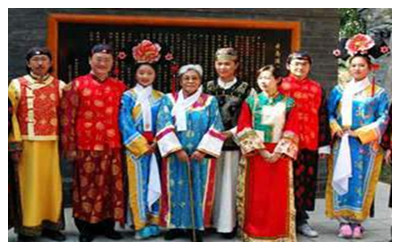Skype: neodalle-travel
Tel: +86 135 7447 2266
E-mail: sales@visitaroundchina.com

 Manchu Minority has a population of 10,682,263, based on the fifth national census of 2000. They live mainly in Heilongjiang, Jilin and Liaoning of north China although the Man minority can be found in most of China's largest cities as well.
Manchu Minority has a population of 10,682,263, based on the fifth national census of 2000. They live mainly in Heilongjiang, Jilin and Liaoning of north China although the Man minority can be found in most of China's largest cities as well.
History of Manchu
The Man ethnic minority (also called Manchu) has a profound and brilliant history of nearly 1,400 years, tracing back to the Sui (581 - 618) and Tang (618 - 907) Dynasties. Arising from the Jurchen tribes and establishing the Jin Dynasty (1115 - 1234) and the Qing Dynasty (1644 - 1911), the Manchu people have greatly influenced Chinese history. Until 1911, the Man ethnic minority had the name of Baqi, synonymous with a distinctive fabric of the Man people.
Life Style of Manchu
Food & Dining
In addition to their literary and artistic accomplishments, they developed agriculture, fishery and animal husbandry for their livelihood, especially after the founding of Modern China in 1949.
Manchu People have a distinctive cuisine with typical dishes that include Chaffy dish, acid soup, blood sausage, and 'bobo', a type of steamed cake. In Manchu culture, eating the meat of dog or any product derived from dog is shunned.
Dressing & Clothing
They are brave and athletic. They excel at riding and shooting, which women and children can do as well as men. In the Qing Dynasty, men plaited their hair on the left side and shaved off the hair around their foreheads. Women wore hair pins, earrings and a once piece dress, the Cheongsam (Qipao).
Customs & Culture of Manchu
The contributions of the Manchu people to Chinese culture, literature, music and arts are considerable. Many emperors of Qing were themselves painters, calligraphers, poets and masters of other literary arts.
People of the Manchu ethnic minority group are good at singing and dancing. Most representative folk dance of the Man Ethnic Minority is the "Zhaoligugu dance", whose libretto clearly reflects the costumes of the Manchu people and their traditional dieting habits and customs. The costumes of the Manchu people are the most characteristic of the northern normadic tribes who do hunting on horsebacks.
The Man encouraged education and many sat for the imperial examinations required of those who would serve the emperor in the highly-sought-after positions of scholars, literati and high-ranking civil servants. Cao Xueqin, the creator of one of the four Chinese classics, Hong Lou Meng (Dream of Red Mansions), reflecting many facets of feudal society during the Qing Dynasty, was of Man ethnicity.
Taboos
People of the Manchu ethnic minority group hold special fondness to dogs, the acts of beating dogs or killing dogs are strictly forbidden, they do not eat meat of dogs, do not wear dogskin hats or wear clothes with dogskin cuffs. Do not chase dogs in the face of the host, and never speak ill of the dogs, or the hosts would think you are insulting him to his eye and would ask you to leave immediately, this is because they put much emphasis on the activity of hunting. The Manchu ethnic minority group takes the West as the superior, so it is a taboo for common people, especially young people to sit on the west Kang, and women are even more strictly forbidden to give birth to her child on the West Kang. Besides, people of the Manchu ethnic minority group are not allowed to hit pied magpies and crows, or to tie livestocks on the Suoluo tree poles.
Festivals of Manchu
Traditional festivals of the Man are similar to those of the Han people. During the Chinese New Year, Lantern Festival, Dragon Boat Festival, and Mid-Autumn Day, distinctive sports like skating are included in the festivities of the Man people.
 Ask Questions ?
Ask Questions ?